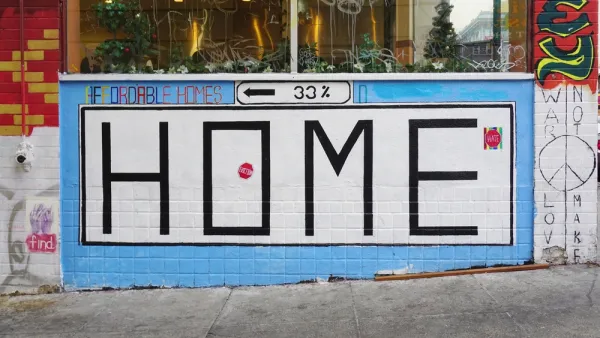Tired of not closing deals to preserve affordable housing due to delays in public financing, the nonprofit Housing Partnership Network created a real estate investment trust. The results have been "game changing."
Pam Fessler studies the example of the Housing Partnership Network, a coalition of housing nonprofits that created a real estate investment trust (REIT) to become more competitive in the housing market.
Dependent on government bond issues and housing tax breaks to pay for projects created a typical problem, according to Chrsistopher LoPiano, VP of Community Preservation and Development Corp., an affordable housing nonprofit in the Washington, D.C., area and Virginia "What we're not competitive on is closing quickly," says Lopiana in Fessler's report, "because we're dependent upon public financing, and public financing just takes longer."
"So...the Housing Partnership Network, decided it was time to get creative — to do what private investors have done for decades. They became the first nonprofits to form what's called a real estate investment trust, or REIT."
"The nonprofit groups figured they could offer potential investors a modest return on their money — about 5 to 7 percent. It's less than what they'd get from a private-sector REIT, but the groups also appealed to investors' desire to preserve affordable housing. And they got several big ones — Prudential, Morgan Stanley, Citibank and the Ford and MacArthur foundations — to chip in an initial $100 million."
The report has more on the initial successes and challenges of the REIT arrangement for the nonprofit sector. "So far, the Housing Partnership trust has purchased three properties like this — in Virginia, Illinois and California. Ades says the trust is looking at other apartments and making plans to raise an additional $250 million."
Fessler's lede mentions the rental housing by the Joint Center for Housing Studies at Harvard, which was also detailed recently by the Sustainable Housing Collective.
FULL STORY: Nonprofits Pull In Investors To Tackle Housing Affordability

Analysis: Cybertruck Fatality Rate Far Exceeds That of Ford Pinto
The Tesla Cybertruck was recalled seven times last year.

National Parks Layoffs Will Cause Communities to Lose Billions
Thousands of essential park workers were laid off this week, just before the busy spring break season.

Retro-silient?: America’s First “Eco-burb,” The Woodlands Turns 50
A master-planned community north of Houston offers lessons on green infrastructure and resilient design, but falls short of its founder’s lofty affordability and walkability goals.

Test News Post 1
This is a summary

Analysis: Cybertruck Fatality Rate Far Exceeds That of Ford Pinto
The Tesla Cybertruck was recalled seven times last year.

Test News Headline 46
Test for the image on the front page.
Urban Design for Planners 1: Software Tools
This six-course series explores essential urban design concepts using open source software and equips planners with the tools they need to participate fully in the urban design process.
Planning for Universal Design
Learn the tools for implementing Universal Design in planning regulations.
EMC Planning Group, Inc.
Planetizen
Planetizen
Mpact (formerly Rail~Volution)
Great Falls Development Authority, Inc.
HUDs Office of Policy Development and Research
NYU Wagner Graduate School of Public Service



























